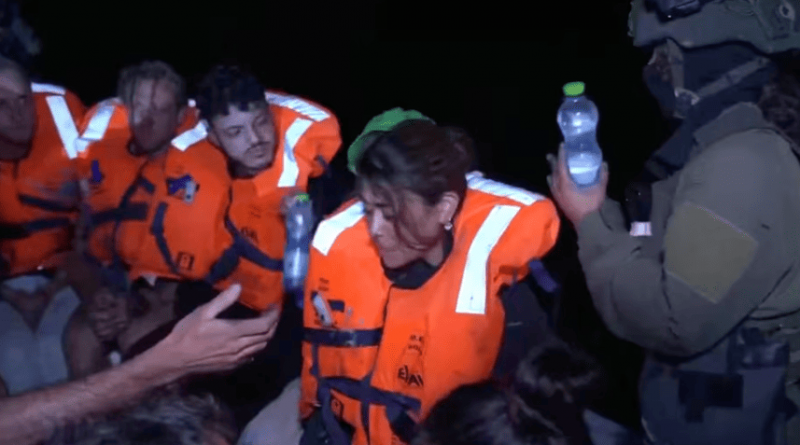Israeli Navy Seizes Gaza-Bound Aid Vessel Carrying Greta Thunberg, Sparks Global Uproar
Jerusalem — In a pre-dawn operation that has reignited international debate over the humanitarian situation in Gaza, Israeli naval forces intercepted and seized the British-flagged yacht Madleen, which was attempting to breach the naval blockade to deliver aid and draw global attention to the ongoing Gaza crisis.
On board was Swedish climate activist Greta Thunberg, along with 11 other crew members including Rima Hassan, a French Member of the European Parliament.
The vessel, operated by the Freedom Flotilla Coalition (FFC), carried a modest consignment of humanitarian aid—baby formula and rice—intended for civilians in Gaza, where the United Nations has warned of looming famine and mass displacement following months of war.
Seized in International Waters
According to a statement by the FFC, Israeli forces boarded the vessel at around 2:00 a.m. local time while it was still in international waters. A dramatic image shared by the coalition shows crew members sitting with hands raised, illuminated by intense spotlights.
Israeli authorities later confirmed the interception, stating that the crew was unharmed and en route to the Israeli port of Ashdod. “The ‘selfie yacht’ of the ‘celebrities’ is safely making its way to Israeli shores. The passengers are expected to return to their home countries,” wrote Israel’s Foreign Ministry on X (formerly Twitter).
The ministry added that the activists were “provided with sandwiches and water,” before bluntly concluding: “The show is over.”
Detentions and Defiance
The crew has reportedly been detained for interrogation. Rima Hassan posted on X, “The crew of the Freedom Flotilla was arrested by the Israeli army in international waters around 2 a.m.,” reaffirming their resolve by sharing the image of the crew’s detention.
In response, climate activist Greta Thunberg has yet to issue a direct statement, but supporters have called the seizure a blatant act of aggression against peaceful humanitarian efforts.
The Israeli Defense Ministry, however, defended the operation. Defense Minister Yoav Gallant said he had authorized the naval action to prevent what he labeled a “propaganda exercise supporting Hamas,” and confirmed that the intercepted aid would be routed through “official humanitarian channels.”
A Polarizing Mission
The Madleen’s voyage was never about scale—it carried only a symbolic amount of aid. But its intent was powerful: to highlight the severe humanitarian crisis in Gaza and challenge the legality and morality of Israel’s long-standing naval blockade.
Israel has enforced the blockade since 2007, after Hamas seized control of the coastal enclave. While Israel and its allies justify the measure as essential to preventing arms smuggling, critics argue it constitutes collective punishment against Gaza’s 2.3 million residents.
The situation has worsened dramatically since the October 7, 2023, Hamas-led attack on southern Israel, which killed over 1,200 people and led to the abduction of more than 250 individuals, according to Israeli sources.
In response, Israel launched a relentless military campaign that has killed over 54,000 Palestinians and displaced the vast majority of Gaza’s population, according to the Gaza Health Ministry.
International Support and Condemnation
The United Nations’ Special Rapporteur on the Palestinian Territories, Francesca Albanese, voiced strong support for the flotilla’s efforts.
In a post on X, she wrote, “Madleen’s journey may have ended, but the mission isn’t over. Every Mediterranean port must send boats with aid & solidarity to Gaza.”
Hamas condemned the seizure of the vessel, calling it “state terrorism” and saluting the activists for their “moral courage” and “solidarity with the oppressed.”
Meanwhile, Israeli Defense Minister Israel Katz revealed a provocative plan to show the detained activists videos of the October 7 Hamas attacks upon their arrival at Ashdod Port. “They need to see what they are defending,” he declared.
A Legacy of Flotillas
The interception of the Madleen echoes earlier flotilla efforts to challenge Israel’s blockade. The most infamous incident occurred in 2010, when Israeli commandos stormed the Mavi Marmara, a Turkish vessel, killing ten activists in an operation that strained Israel’s diplomatic ties with Turkey and ignited international outrage.
While this week’s operation ended without violence, it has once again exposed the raw tensions surrounding Gaza and the sharply diverging narratives around activism, security, and human rights.
The Freedom Flotilla Coalition said its mission is far from over. “We are not deterred. More ships will sail. The people of Gaza are not forgotten,” it said in a statement.
Aid Symbolism vs. Political Narrative
Though the Madleen carried only a symbolic quantity of aid, its interception has transformed it into a powerful political message. For supporters of Gaza, it represents solidarity against a prolonged humanitarian siege. For Israel, it is a line that cannot be crossed without invoking national security concerns.
This confrontation, once again, places the international community at a crossroads: should symbolic activism be embraced as a tool to spotlight suffering, or be condemned as a political stunt that complicates diplomacy and security?
Whatever the answer, the image of Greta Thunberg—more often associated with climate marches and UN podiums—being escorted by naval forces in a geopolitical flashpoint, has thrust the Gaza crisis back into the global spotlight.



